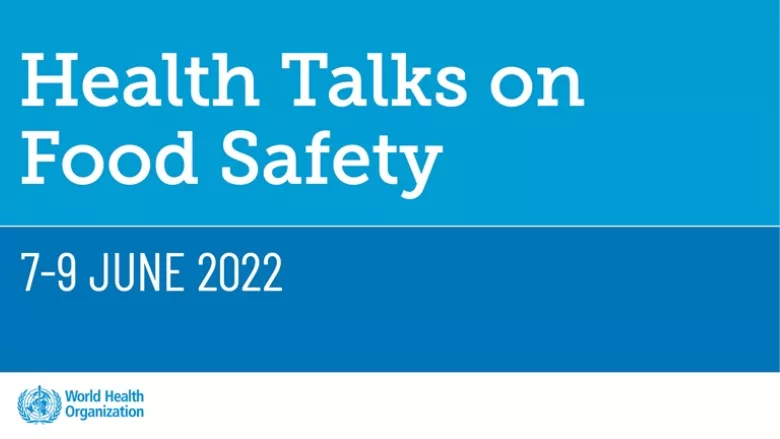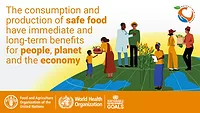WHO Health Talks on Food Safety 2022

Credit: World Health Organization of the United Nations (WHO)
Beginning on World Food Safety Day, the World Health Organization (WHO) virtually hosted its Health Talks on Food Safety from June 7–9, 2022. The third annual Health Talks explored how consumer behavior, as well as intentionally structuring food systems and supply chains, can prevent foodborne illness and make safe food available to all. The Health Talks also addressed the intersection of these themes with the role of national governments and policymaking. The three-day event featured 11 panel discussions that included global representatives from the food industry, non-governmental organizations, research and academic institutions, and government agencies.
The Health Talks started with a panel on “Improving Emergency Response in Global Food Safety,” which highlighted the international efforts that are in place to assist counties as they respond to food safety incidents, to strengthen their food safety systems, and to contribute to improved collaboration and information-sharing on a global scale. The ways in which national and local governments, industry, and other stakeholders can contribute to international efforts to realize the goal of “safer food, better health” was continuously discussed in subsequent Health Talks.
In one session, WHO officials and representatives from United Nations Member States discussed the new WHO Global Strategy for Food Safety 2022–2030 (GSFS). The strategy, which was approved on May 27, 2022, aims to guide and support Member States in their efforts to prioritize, plan, implement, monitor, and regularly evaluate their food safety efforts. GSFS encompasses five strategic priorities, which are: 1) strengthening national food controls systems, 2) identifying and responding to food safety challenges that arise with the evolution of food systems, 3) increasing the use of scientific evidence and risk assessments in decision-making, 4) strengthening stakeholder engagement and risk communication, and 5) promoting food safety as an essential component of trade. The session also discussed the importance of having a global approach to strengthening food safety systems, and lauded the commitments Member States are making to achieving food safety goals.
In another session, the use of digital technologies to strengthen food safety control systems was explored, taking into account the varying levels of regulator readiness and the burden of foodborne disease in different counties. The U.S. Food and Drug Administration (FDA) Deputy Commissioner, Frank Yiannas, made remarks during the session, explaining how the digitization of food systems can benefit traceability, improve data quality and quantity, and identify and respond to supply chain disruptions. Yiannas shared a quote to emphasize the importance of utilizing digital technologies to continuously ensure food safety in an ever-changing, interconnected, global food system. “The pace of change has never been this fast, yet it will never be this slow again,” he said. “The 20th Century was known as the industrial age, but the 21st Century is the data and digital age. Working together, we can unleash the power of data and truly bend the curve of foodborne illness in all nations, so that people worldwide can live better lives.”
The session “Emerging Issues in Food Safety” addressed the need for a proactive approach to identify and manage potential food safety risks that may come with tech-driven innovations in food production. Vittorio Fattori, Ph.D., of the Food and Agriculture Organization of the United Nations (FAO), provided an overview of the FAO foresight program on emerging food safety issues as an example of how the food safety community can stay ahead of emerging risks. “Our agrifood systems are changing—and need to change—to meet the Sustainable Development Goals,” he said. “New technologies can bring new opportunities and benefits, [as well as] some new challenges that we need to better understand.” Dr. Fattori explained that the FAO foresight report identified and analyzed the multitude of complexities in food safety that come with an evolving, global food system, such as: novel food sources and production systems, a circular economy through plastic recycling, environmental microbiomes, and innovations that change the way food is produced and supplied.
Other sessions during the Health Talks focused on empowering consumers’ access to safe food, enabling safer food in traditional markets and food delivery, international harmonization of food safety standards, improved labeling, and leveraging traceability for inclusive and sustainable development. The theme of striving to achieve “safer food, better health” was consistent throughout the talks. The Health Talks concluded with a discussion on “Food Fraud and Food Defense.” The session was intended to prompt industry, academia, and policymakers to reflect on their actions to combat food fraud and enhance food defense.
Recordings of the Health Talks can be accessed here.
Looking for quick answers on food safety topics?
Try Ask FSM, our new smart AI search tool.
Ask FSM →









